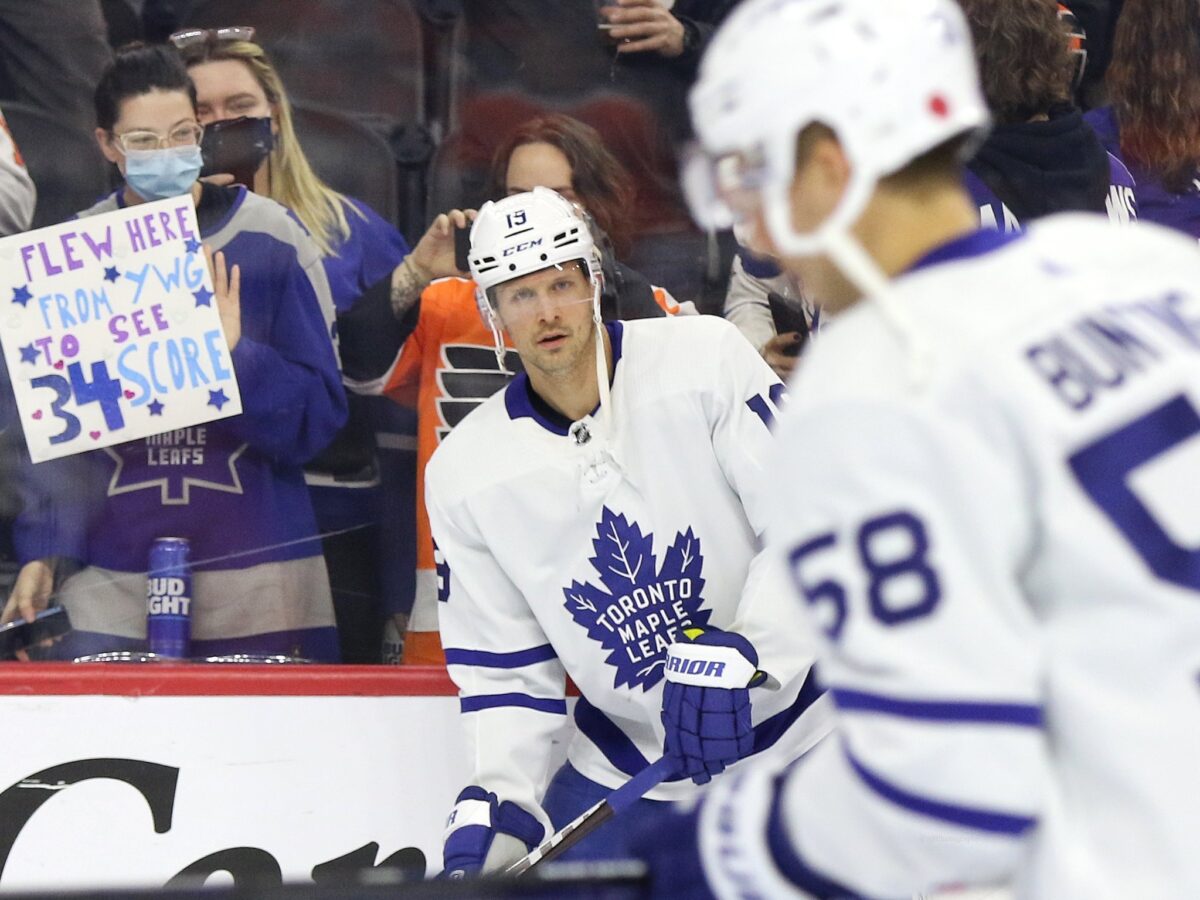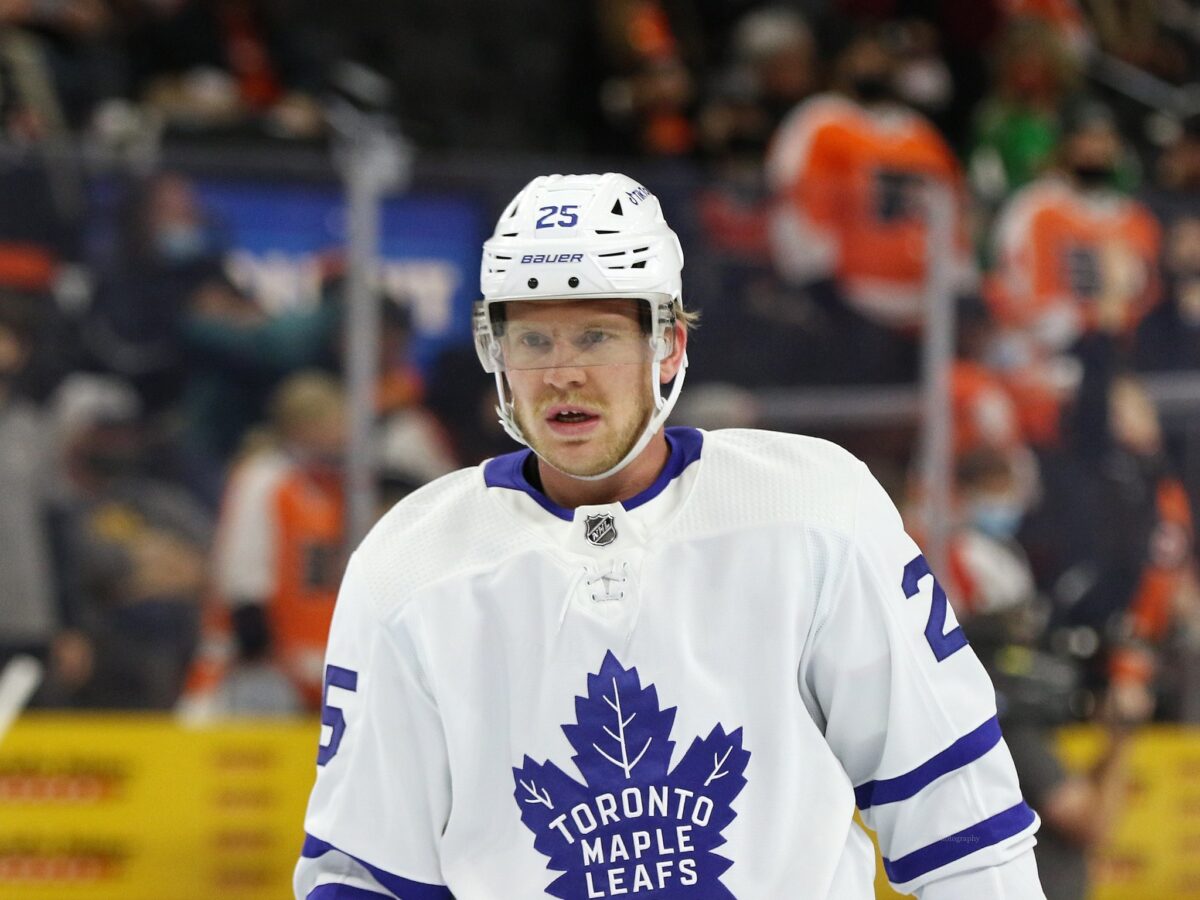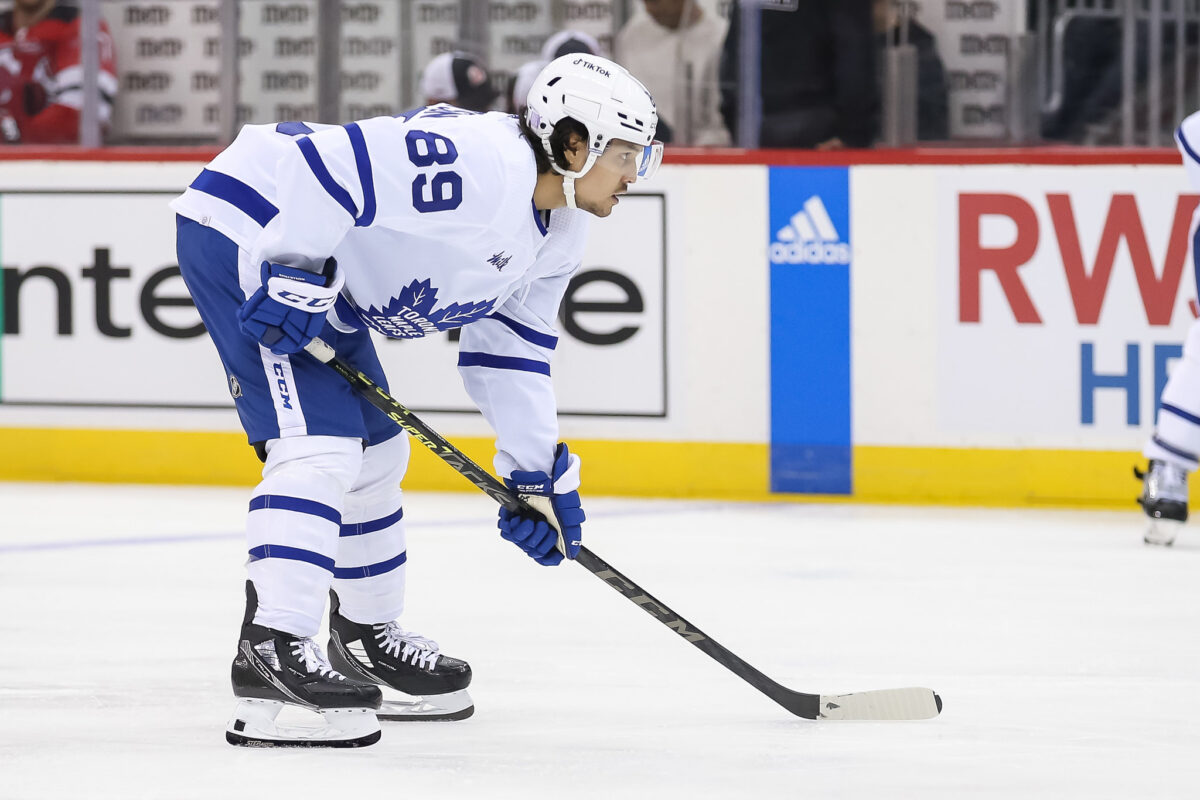One thing that former Toronto Maple Leafs general manager (GM) Kyle Dubas likes more than anything else is a reclamation project. In his time with the Maple Leafs, he had a history of pursuing reclamation projects throughout his tenure as an NHL general manager. Here are a few notable examples:
Reclamation Project One: Alex Galchenyuk
Dubas acquired Alex Galchenyuk in February 2021 after the forward had bounced around multiple teams. Galchenyuk showed flashes of his former potential with the Maple Leafs, contributing valuable depth scoring. However, while he was rumoured to have had an offer from the team, he turned it down. He then really never landed anywhere else in the NHL and has become a bit of a hockey pilgrim.
Related: Ex-Canadien Alex Galchenyuk: 1st Round Draft to Hockey Pilgram
Reclamation Project Two: Tyson Barrie
Tyson Barrie was acquired from the Colorado Avalanche in a deal that sent Nazem Kadri the other way. While Barrie wasn’t truly a reclamation project, his offensive capabilities were known, but he struggled defensively. Still, Dubas took a chance on his potential to bolster the Maple Leafs’ blue line. Barrie never found the same success elsewhere that he had with the Avalanche, and after a stint with the Edmonton Oilers and Nashville Predators, he’s now an unrestricted free agent.
Reclamation Project Three: Jason Spezza
Jason Spezza was a different kind of reclamation project. He was signed as a veteran presence who many thought was well past his prime. Dubas saw value in his experience and leadership, and Spezza provided solid depth scoring and mentorship to younger players. Dubas and Spezza became close working colleagues and, when Dubas went to the Penguins, Spezza followed.

Reclamation Project Four: Matt Murray
Dubas acquired Matt Murray in a trade with the Ottawa Senators in July 2022. Murray had been a two-time Stanley Cup champion with the Penguins but had struggled with injuries and inconsistency in Ottawa. Dubas saw a chance to bring in a goalie with a championship resume and the potential to rediscover his form. Murray’s injuries kept him out of the lineup. Still, Dubas took a risk to bolster the team’s goalie situation. Murray just signed a bargain-basement contract with the team for this season. Could he make a return to his former success?
Reclamation Project Five: Ilya Samsonov
Dubas signed Ilya Samsonov to a one-year deal in July 2022 after the Washington Capitals decided not to extend a qualifying offer to the restricted free agent. Samsonov had struggled with consistency during his tenure in Washington. However, Dubas’ move paid off, and Samsonov provided solid games during the 2022-23 season. After his struggles last season, he’s now on another one-year deal with the Vegas Golden Knights.
Related: Maple Leafs’ Samsonov Shows Human Side of Professional Sports
Reclamation Project Six: Nick Ritchie
Nick Ritchie was signed in the 2021 offseason after being let go by the Boston Bruins. While his tenure with the Maple Leafs was short-lived because he never got on track, Dubas saw potential in Ritchie’s physical style and goal-scoring ability. Ritchie kicked around the NHL for a couple of seasons after he left the Maple Leafs and last season played in Finland’s SM-liiga and Germany’s Deutsche Eishockey League.
Reclamation Project Seven: Ondrej Kaše
Dubas signed Ondrej Kaše just before the 2021-22 season. Although Kase had an injury history, Dubas bet on his talent and hoped he could put together a healthy season to make a significant impact. He was solid when he played for the Maple Leafs, but his concussions kept him sidelined. Fortunately, Kase seems to be on the mend and played last season back home in Czechia – was a point-a-game player there and contributed to his home team’s International Hockey Championship this year.

While not all reclamation projects pan out, Dubas’ approach demonstrates his belief in giving players opportunities to rejuvenate their careers. This strategy can lead to high rewards for minimal investment, fitting well within a cap-constrained league like the NHL.
Could Nick Robertson Be Another Reclamation Project for Dubas?
As the Penguins strategize for the upcoming season, there have been rumours about a potential interest in acquiring Nick Robertson from the Maple Leafs. The 22-year-old forward, who just completed his entry-level contract, has become a restricted free agent and is currently unsigned. Rumours are also that he has asked the Maple Leafs for a trade to another team.
Related: NHL Rumors: Hurricanes, Maple Leafs, Stars, Sharks
With his former GM Dubas always seeking low-cost reclamation projects, could this set the stage for a reunion? The Penguins are aiming for a resurgence after missing the playoffs in 2023. They’ve been active in adding veteran talent to their roster. Last season, they brought in Erik Karlsson at great expense. This offseason, they added veteran Kevin Hayes. However, the franchise is also looking at younger players who can contribute now and in the future.
Robertson’s Potential Move
Robertson, drafted by Dubas in the second round of the 2019 NHL Draft, has shown flashes of potential. However, he has struggled with injuries and inconsistent play. With 34 points in 87 career NHL games, Robertson’s talent is evident, but he hasn’t fully capitalized on his opportunities in Toronto. In his mind, he likely has not been given a fair shake. Even after having a strong preseason, because he was waiver exempt he was a surprise move to the American Hockey League (AHL) Toronto Marlies.
If Robertson persists in his desire to be traded, would Dubas, known for his affinity for reclamation projects, see value in bringing Robertson to Pittsburgh? Part of the answer to that question is what the cost would be. If it’s minimal, that would make sense. In response, Toronto GM Brad Treliving has spoken about the situation. He’s emphasized that the Maple Leafs see Robertson as an important player despite his frustrations.
Now What for Robertson and the Maple Leafs?
The Penguins have the salary-cap space to fit Robertson onto their roster. Financially, they have $3.5 million in salary-cap space, enough to accommodate his projected contract. Projections are that he could sign a two-year, $2.7 million contract with a cap hit of just over $1.3 million. This fits well within Pittsburgh’s budget and provides them with a low-risk, potentially high-reward player.

The connection between Dubas and Robertson makes this a plausible scenario if the Maple Leafs cannot convince Robertson to stick around. If the Penguins can acquire Robertson for a reasonable cost, it could provide both the player and the team with a fresh start. His offensive upside and familiarity with Dubas might just be the key to unlocking his full potential in Pittsburgh.
Could Robertson Land in Pittsburgh?
As the offseason progresses, Maple Leafs fans should keep an eye on the potential of moving Robertson. The Penguins are seeking more offence, and the move would be consistent with GM Dubas’ pattern of pursuing reclamation projects. He loves to identify players with high potential who have faced setbacks. Often they don’t work out, but that doesn’t mean he won’t continue to swing for the fences.
Related: Where Are They Now? The Jonathan Cheechoo Edition
Dubas’ approach offers the team the chance to benefit from high-reward scenarios with relatively low financial risk. The strategy underscores Dubas’ belief in the value of giving players a fresh start and the opportunity to prove themselves in a new environment.
